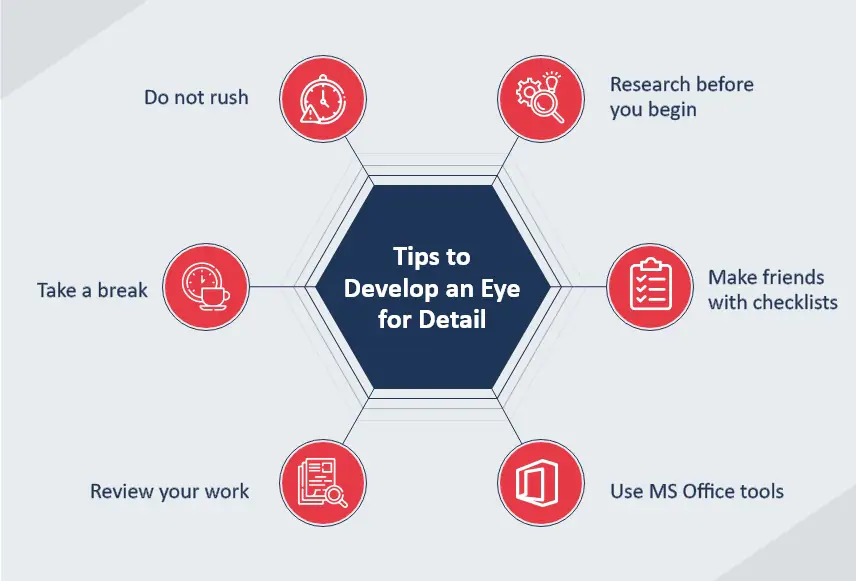
“I love the way your team pays attention to details and picks up such little things that are easy to ignore,” said one of our clients on the call last evening when we discussed the project highlights. This annotation from the client made me think about the importance of paying attention to details and its impact on the overall quality of the courses we create.
In the eLearning industry, quality is one of the most significant criteria that helps an organization stand out. Everyone involved in the project is responsible for ensuring the courses delivered are free from the obvious issues (technical and/or functional) and the small things that require a keen eye for detail.
According to author and media expert Michael Levine, the biggest problems in any business arise from ignoring the smallest detail. And as an instructional designer, I believe that attention to detail should be put into practice right from the beginning of the project. Even the minutest things, if carefully looked at right from the start, can help reduce errors, increase efficiency, and enhance the finishing of the final product.
Why Do You Need to Develop an Eye for Detail
Developing an eye for detail is crucial in enhancing the customer experience and fostering customer centricity. By paying close attention to minor aspects and intricacies, businesses can create a more personalized and tailored experience for their customers.
According To PwC, 65% Of U.S. Customers Consider Positive Experience More Influential Than Exceptional Advertising.
Attention to detail extends to every customer interaction, from the clarity and consistency of communication to the user-friendliness of digital interfaces. By honing their eye for detail, businesses can provide customers with accurate and relevant information, customized recommendations, and seamless interactions across various touchpoints.
When organizations cultivate an eye for detail, they demonstrate a deep understanding and empathy toward their customers’ needs and preferences. This heightened sensitivity allows them to anticipate and address customer pain points, ensuring a smoother and more satisfying experience.
Tried and Tested Techniques to Develop an Eye for Detail
Indeed, developing an eye for detail helps you improve customer experience without compromising quality. However, it’s not as simple as it sounds; paying attention to details is a skill that needs to be acquired, and just like other skills, it requires conscientious practice.
Here are 6 simple ways to develop an eye for detail:

1. Research before you begin
Do some study before you start a new assignment. For example, get to know your customers, their language preferences, writing styles, graphics, and color schemes, and do not hesitate to ask detailed questions. The more thorough you are while asking questions in the beginning, the better it is for the project at later stages.
2. Make friends with checklists
Checklists come in handy when you have to work on multiple projects simultaneously, each following different standards. These effective little tools help you improve your attention to detail by tracking what you might otherwise miss. The habit of creating checklists pays off well.
3. Use MS Office tools
MS Office tools are your saviors for many small slips, like typos, inconsistent formatting of your bullets, different capitalization method for the section headers in your document, and inconsistent spellings (for example, E-learning vs eLearning).
These little slips may not be seen up-front but allow clients to form a not-so-good impression about your work. MS Office tools can help you fix these slips to a great extent. For example, F7 can check spellings for you, Ctrl+Shift+C and Ctrl+Shift+V can apply the same format across all pages, and the Find and Replace option can help maintain consistent writing styles.
4. Review your work
Review your documents several times to ensure everything is in order. If possible, have another pair of eyes review your work and provide feedback. Inviting another person’s perspective is always good as it allows you to think deeper about what you may not have previously considered.
5. Take a break
Yes! That’s right. Take a break, grab a coffee, or take a quick walk if you lose focus or feel tired. If you continue working when you can barely concentrate, you will miss out on details. So, take some time out and resume work when you feel refreshed.
6. Do not rush
Take time to complete your work, as speed induces errors. Sometimes you have multiple deliverables on the same day or week. Plan your tasks as per priority so you can give enough time to each deliverable without overlooking small things that may make a big difference.

Harbinger is Committed to Developing an Eye for Detail
Harbinger is known for paying attention to detail in our eLearning design and development projects. This is evident from our emphasis on Customer Centricity, which is one of our core values. We meticulously gather feedback from our customers to understand their needs and preferences. This valuable insight allows us to tailor our eLearning content development products and services to exceed customer expectations.
Harbinger invests significant resources in training its eLearning teams including instructional designers and project managers to provide exceptional customer service. By empowering our staff with the necessary skills and knowledge, we ensure that every interaction with customers is handled with utmost care and attention to detail.
Our eLearning experts focus on intelligent content automation with ChatGPT and AI models to stay detail-oriented throughout the customer journey. We leverage Generative AI technologies and frameworks like Harbinger iContent to help businesses develop an eye for detail in improving the customer experience.
Practice Makes You Better
Learning to pay attention to detail is a continuous exercise, even for people with a keen eye for detail. So, slow down and start paying attention to details using the tips mentioned above as your checklist, and let the quality of your work define you.
If you want to build a customer-centric strategy or develop an eye for detail to improve your customer experience, write to us at contact@harbingergroup.com. Our eLearning experts would be more than happy to help you meet your business goals.





